Actobotics Kit - ActoBitty 2
This is the ActoBitty 2 from Actobotics, an easy to assemble starter robotics kit that is perfect for beginning builder. This little kit, once assembled creates a small robotic platform that, with an attached an Arduino, you can start using almost immediately! Inside this kit you will find all the mechanical parts and motors needed to build this little robot platform.
The aluminum chassis included in this kit accepts all Actobotics components for quick and easy customization while the innovative “snap on” Arduino channel mounts make it easy to attach an Arduino Uno or Arduino Mega board without hassle! In the Recommended Products section below you will also find a Raspberry Pi channel mount in case you choose to drive this platform without an Arduino. In this kit you will also find two 2” diameter drive wheels with rubber lips and aluminum hubs that when combined offer fantastic traction, stability, and strength. A custom Acetal mount plate, that attaches to the underside of the ActoBitty 2 provides a perfect attachment surface for a variety of sensors including line followers, accelerometers, or any other sensor you might want to incorporate. The ActoBitty is perfect for both educational settings and individual hobbyists!
Actobotics is a robotics building system based around extruded aluminum channels, gears, precision shafts, and ball bearings. Thanks to the two standardized hole patterns, nearly all Actobotics components can be intuitively connected together. The wide range of components makes building complex electromechanical prototypes or finished projects a reality.
Note: A few required items that are not included in this kit that will be required to make the ActoBitty 2 fully operational, including: four AA Batteries, a Phillips Head Screwdriver, a Arduino Uno or Arduino Mega, and a motor driver.
- 1x Aluminum Channel - 4.50"
- 2x Micro Gearmotor - 90 RPM
- 2x Micro Gearmotor - Enclosure
- 2x Hub - Set Screw (3mm Bore)
- 2x Precision Disc Wheel - 2" (Clear)
- 2x Rubber Ring - 1.65"ID x 1/8"W
- 12x Machine Screw - Socket Head (6-32 ; 3/16")
- 2x Actobotics Channel Mount - Arduino
- 2x Acetal Battery Mount
- 1x Acetal Caster/Sensor Mount
- 1x Acetal Caster
- 1x 4 Cell AA Battery Pack
- 2x Phillips head Screw - 2-32 x 3/16”
- 1x 1/16” Hex Key
- 1x 7/64” Hex Key
- Product Page (637146)
- Product Video
Actobotics Kit - ActoBitty 2 Product Help and Resources
TB6612FNG Hookup Guide
September 29, 2016
Basic hookup guide for the TB6612FNG H-bridge motor driver to get your robot to start moving!
Core Skill: Robotics
This skill concerns mechanical and robotics knowledge. You may need to know how mechanical parts interact, how motors work, or how to use motor drivers and controllers.
Skill Level: Rookie - You will be required to know some basics about motors, basic motor drivers and how simple robotic motion can be accomplished.
See all skill levels
Core Skill: DIY
Whether it's for assembling a kit, hacking an enclosure, or creating your own parts; the DIY skill is all about knowing how to use tools and the techniques associated with them.
Skill Level: Noob - Basic assembly is required. You may need to provide your own basic tools like a screwdriver, hammer or scissors. Power tools or custom parts are not required. Instructions will be included and easy to follow. Sewing may be required, but only with included patterns.
See all skill levels
Core Skill: Electrical Prototyping
If it requires power, you need to know how much, what all the pins do, and how to hook it up. You may need to reference datasheets, schematics, and know the ins and outs of electronics.
Skill Level: Rookie - You may be required to know a bit more about the component, such as orientation, or how to hook it up, in addition to power requirements. You will need to understand polarized components.
See all skill levels
Comments
Looking for answers to technical questions?
We welcome your comments and suggestions below. However, if you are looking for solutions to technical questions please see our Technical Assistance page.
Customer Reviews
3.3 out of 5
Based on 3 ratings:
5 of 5 found this helpful:
Challenging Assembly for Kids
I had problems with my kit. The Allen wrench supplied did not fit the screws! I had to custom grid tools just to assemble the robot. The platform on the top really did not have enough room for a motor driver and sensors. Once they get the correct wrench in the package it might be easier. The parts are much more expensive then other kits but the quality seems good.
Hi, So sorry to hear about your issues. I will look into the wrench issue and see what we can do to help resolve that matter.
1 of 1 found this helpful:
Reasonable instuctions
Looks to be good quality, however the supplied allen wrench doesn't fit the machine screws. Not a huge deal for me as I'm sure I can find the proper size, but could be very annoying to a first-time builder. The screws are 7/64 and I'm guessing the wrench might be metric 2.5. Looks like it should be nice when assembled. I purchased this because the parts should work well for future builds.
Update (4/13/2015): I finally got around to completing the kit. It works well on a hard surface, but not on carpet, even low pile. I'm probably going to add larger wheels along with a ball caster before I add sensors.
Hi, So sorry that you were affected by this issue as well. We have corrected all of our remaining stock and are working with Actobotics to help avoid this mistake from happening again in the future. Please contact us if you need help getting a proper hex wrench. Happy hacking.
2 of 2 found this helpful:
Best rover chassis I have found for the price
Before I spent too much money, I wanted to make sure I had the skills and parts to build a successful rover bot, so I chose to start with the Actobitty. After completing the first version of a rover project, I still feel I made the right choice. Any difficulties I encountered were not the fault of the Actobitty kit.
Even though this kit was clearly designed with affordability as a prime feature, they still included a 4-AA battery pack, which I appreciate. I was worried about the plastic skid in lieu of a real front caster, but it has worked fine on all of the non-carpeted indoor surfaces I have tried so far. If I could change one thing, it would be the option to choose Raspberry Pi mounting clips instead of Arduino.

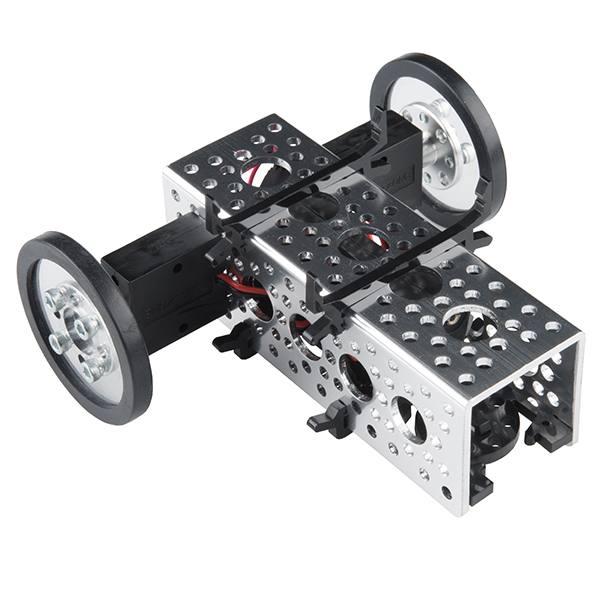
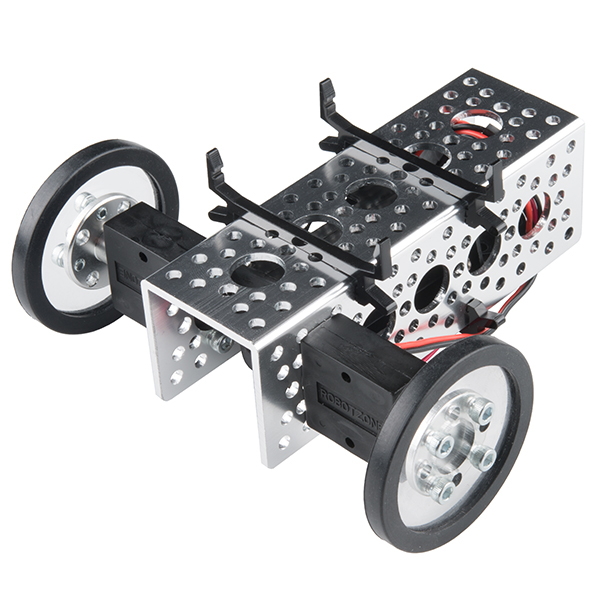
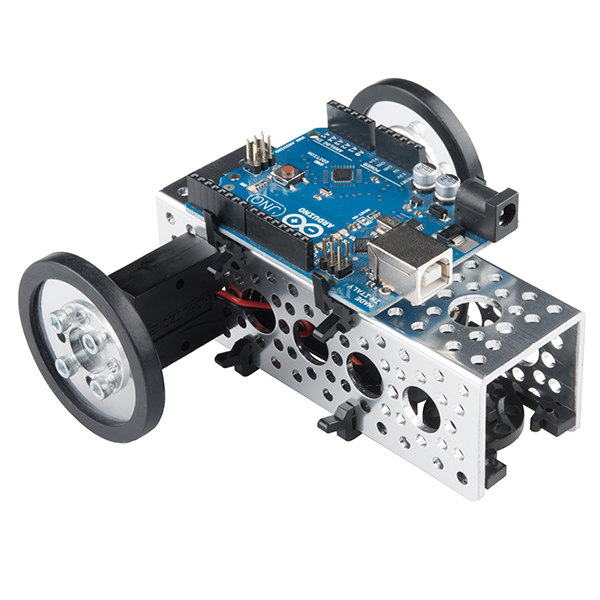
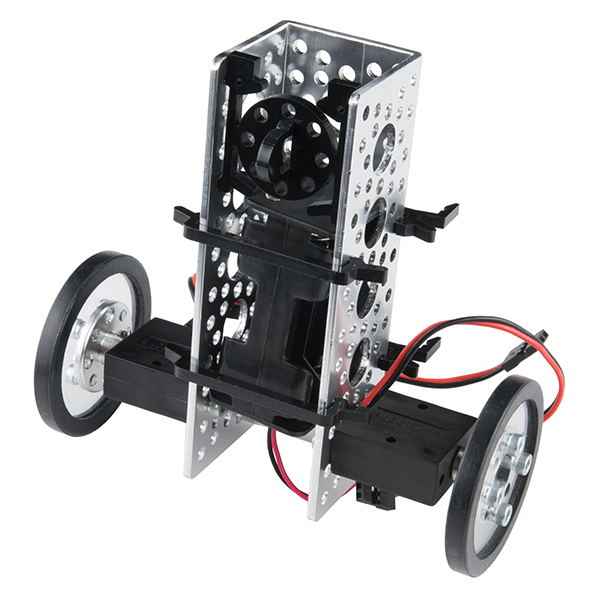
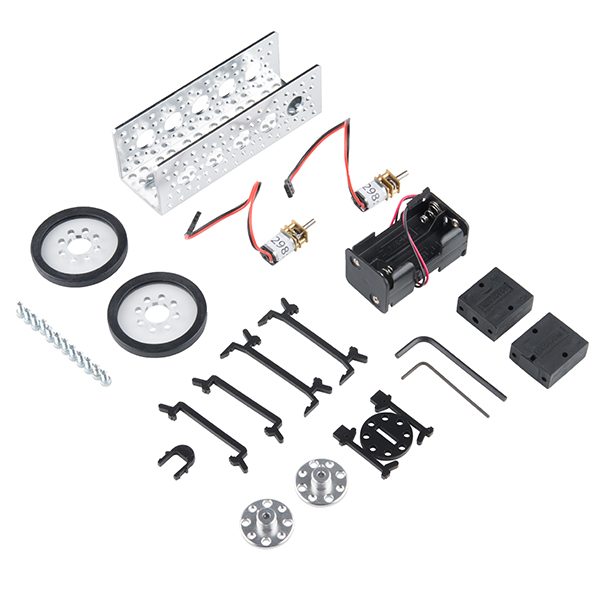
Wake up early for the biggest sale of the season, and this is sold out...with no back order. Will you be restocking this item before December 02, 2014 01:59 EST?
Apparently not. Thanks for the response. O_o
Hate to sound like Goldilocks, but it would be nice if you offered a kit somewhere between this model and the Nomad, both in price and size.
Ok, so I have this kit, a L293D and a Raspberry Pi. I have it all set up and can control the motors (powered by the 4AA's) but the Pi is still getting power from the plug. Can I power the the Pi from the 4 AA batteries as well? It is a model A+, which I think is relevant since they redesigned the power circuit.
Can you give us the assembled dimensions? (I wonder if this might work for a Sumo Bot 10cm x 10cm competition?)
126mm x 115mm. The 126 is actually wheel to wheel (well screw to screw since they stick about a bit past the wheels
Can an Arduino drive the motors directly? The description states that you just need an arduino, some batteries, and a screw driver to complete this kit, but I think you still won't be able to make it move. Am I missing something? Maybe there is a big diode, or motor controller that I don't see.
Ah nice catch. You will need some form of motor driver along with an Arduino to get the ActoBitty working. We've updated the description to reflect that.